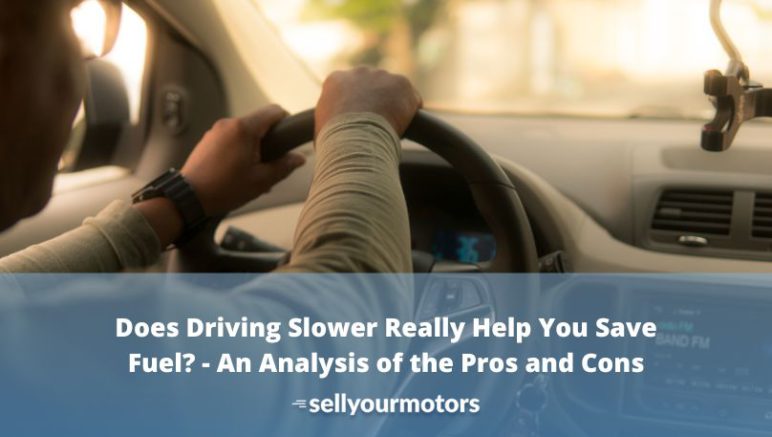With the world becoming increasingly concerned about climate change and the environment, there is a growing focus on finding ways to reduce our carbon footprint. One potential way to do this is to reduce the amount of fuel we use when travelling in our vehicles. But is driving slower really an effective way to save fuel? In this article, we will explore the pros and cons of driving slower in order to answer this question. We will look at the impact on fuel consumption, vehicle performance and safety, and discuss the potential cost savings that can be achieved. We will also consider how this might affect our journey times and, ultimately, our overall quality of life. So, let’s dive in and take a closer look at the pros and cons of driving slower to save fuel.
Overview of Driving Slower to Save Fuel
The basic idea behind driving slower to save fuel is that by travelling at a lower speed, you will use less fuel. So, if you travel at 50 miles per hour (mph) instead of 70 mph, you will use less fuel. Or if you travel at 30 miles per hour instead of 40 mph, you will use even less fuel. The logic is that the less fuel we use, the less CO2 we emit, and therefore the less impact we have on the environment. So, this is an idea many people would like to support. Driving slower really does have a positive impact on fuel consumption. In fact, the higher your speed, the more fuel you will use. This means that the faster you drive, the greater your fuel consumption will be. So, driving slower really is an effective way to save fuel. But just how much less fuel are we talking about? And is it worth it? Are there any other factors we need to consider? Let’s take a look at a few pros and cons of driving slower to save fuel.
Impact on Fuel Consumption
As we just discussed, the higher your speed, the greater your fuel consumption will be. Driving at higher speeds uses more fuel, which means that driving slower will save you more fuel. As such, travelling at 30 mph instead of 40 mph will lead to a reduction in fuel consumption of around 20%. Driving at 20 mph instead of 30 mph will reduce your fuel consumption by around 40%. However, not all vehicles will experience the same reduction in fuel consumption when travelling at different speeds. This is because different vehicles are designed with different aerodynamic properties. This will impact the amount of fuel consumed at different speeds, with aerodynamic drag being the most significant factor. For example, a sedan will experience an increase in fuel consumption at high speeds due to the wind drag it creates. This is because the air will flow more slowly around the vehicle, creating a greater amount of drag. This, in turn, creates more lift in the back of the vehicle, which increases the amount of fuel required to drive.
Impact on Vehicle Performance and Safety
Another important thing to consider when driving slower to save fuel is the potential impact on vehicle performance and safety. Lower speeds will result in longer stopping distances, as well as reduced vehicle stability. And this could lead to more collisions and a higher risk of injury. So, driving slower really is an effective way to save fuel. But it is important to remember that this will result in longer journey times. So, if you have a tight schedule to adhere to, you may find that driving slower will make you late. And if you regularly find yourself running late, it may not be an effective way to save fuel. Driving slower also has the potential to negatively impact your quality of life. If you rely on driving to get to places quickly or frequently, driving slower could make it more difficult to do what you need to do. Driving at a lower speed may also make your journey less enjoyable, especially if you are in a rush. So, it is important to consider how driving slower will affect your quality of life.
Potential Cost Savings
Another potential benefit of driving slower to save fuel is that it could result in lower fuel costs. This is because you will be using less fuel, which means you will be spending less money on fuel. How much less you spend will also depend on how much you spend on fuel. If you spend more on fuel, you will save more money if you drive slower. So, driving slower really is an effective way to save fuel. But how much money could you save by driving slower? Depending on your fuel costs and how much slower you drive, you could save a few dollars each month. This could add up to a significant amount over time. If you are travelling long distances, slowing down could also help you save on vehicle maintenance costs.
Driving Slower to Save Fuel: Impact on Journey Times
Another thing to consider when driving slower to save fuel is that this will lead to longer journey times. This is because it takes longer to get to your destination when you drive slower. So, it is important to remember that driving slower really is an effective way to save fuel. But it may not be an effective way to get to where you need to go on time. This may be especially relevant if you regularly drive long distances. Driving slower will also make the roads more congested, which could negatively impact your quality of life. This is because it will take you longer to get to places where there is heavy traffic. And this could lead to more frustration and less enjoyment. It could also contribute to higher emissions and negatively impact the environment.
Driving Slower to Save Fuel: Impact on Quality of Life
Another thing to consider when driving slower to save fuel is that this could negatively impact your quality of life. This is because it will take you longer to get to places, and this could negatively impact your work and social life. It could also make it difficult to make last-minute arrangements with friends, family, or colleagues. It could also make it more challenging to take care of your daily responsibilities, such as dropping off and picking up your children from school. This is because it takes longer to drive the same distance when you drive slower. However, driving slower may have the potential to reduce your risk of being involved in a collision. This is because it makes it easier for other drivers to see you. So, you may be less likely to be in a collision when driving slower. This could reduce the amount of stress you experience. It could also reduce the risk of injury if you are involved in a collision. This could lead to a better quality of life overall.
Driving Slower to Save Fuel: Conclusion
Driving slower really is an effective way to save fuel. This will result in lower fuel costs, a reduction in CO2 emissions, and a reduced carbon footprint. It will also lead to longer journey times, a higher risk of being involved in a collision, and potentially a longer travel time. Driving slower may also negatively affect your quality of life by making it more challenging to make last-minute arrangements, take care of your daily responsibilities, and get to where you need to go on time. So, it is important to consider all of the pros and cons of driving slower to save fuel. This will help you determine if this is the right strategy for you.
Sell Your Motors
Car buying specialists are your best bet when you want to sell your car fast for a fair price. At Sell Your Motors we pride ourselves for being transparent and completing the whole car buying process in only 30 minutes!







